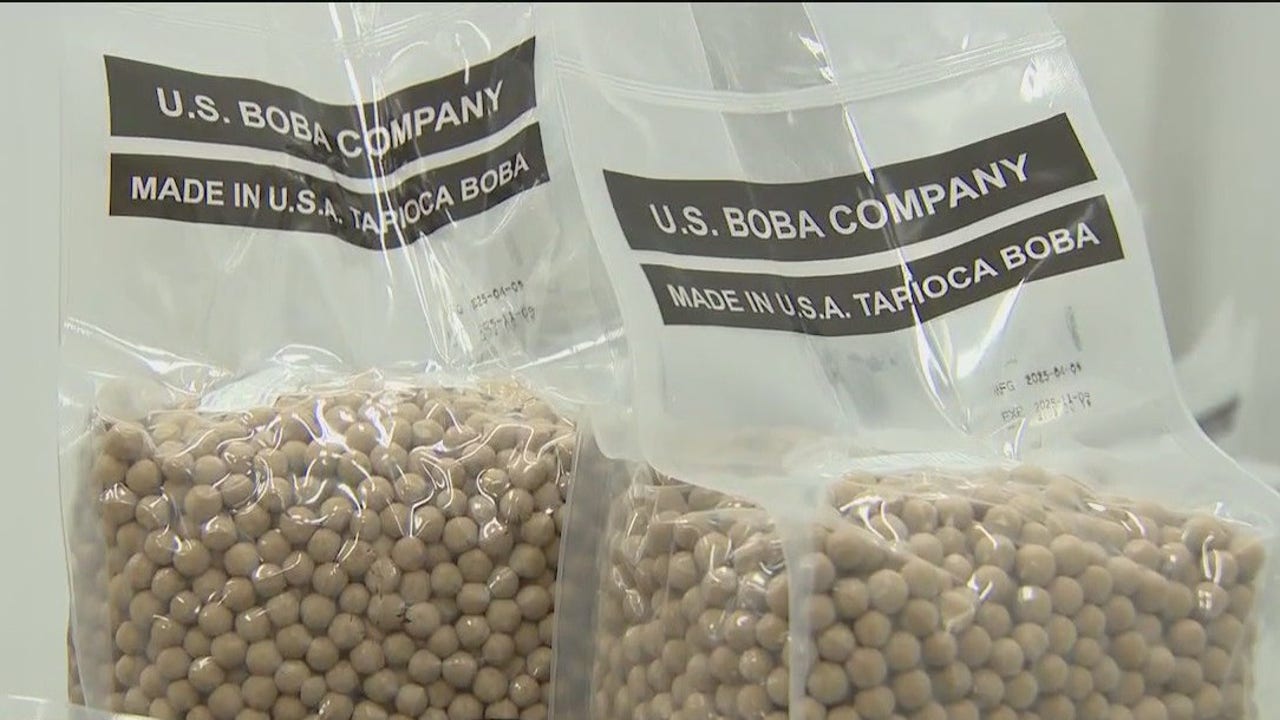Tariffs to impact only boba production facility in the U.S.
New tariffs are expected to affect the only boba production facility in the U.S., located in Hayward, potentially driving up costs for bubble tea ingredients and packaging. Andrew Chau, the co-founder of Bay Area-based Boba Guys, who also runs the tapioca pearl factory, is exploring ways to manage potential price increases.
HAYWARD, Calif. – The cost of everyday food and drinks is expected to rise following President Trump’s latest round of tariffs.
U.S. Boba Company, the world’s first company to produce its own boba outside of Taiwan, operates a factory in Hayward, supplying thousands of cafés, restaurants, and shops across the country.
However, some of its ingredients, including tapioca starch, are imported from Asian countries, such as Thailand.
Andrew Chau, founder of Boba Guys, a popular Bay Area-based bubble tea chain, says that despite being a homegrown brand, his business will still feel the impact of the tariffs.
Chau co-founded U.S. Boba Company eight years ago with David Fan, aiming to bring transparency to the supply chain and offer premium ingredients for bubble tea.
While the majority of Boba Guys’ ingredients are sourced domestically, some components are still imported.
“If you broke down our drinks, you have everything from the tea, to the milk, to the fruit, to the sweetener, even sugar is not always domestic,” Chau said. “Maybe compared to most boba shops and cafes, we have more domestic-made things, like we use really high local quality dairy… even fruits, our strawberries are from Mexico, so even that will get hit with tariffs, our teas are from overseas.”
The new tariffs are expected to directly affect packaging costs, including sustainable bamboo straws, which are made in Taiwan.
Big Picture
The so-called “reciprocal” tariffs, notably including a stunning 104% tariff on Chinese goods, were imposed by the White House in response to China’s own retaliatory tariffs.
This marks a significant escalation in the ongoing trade war, which has sparked widespread concerns of a global economic downturn.
Despite the growing uncertainty, President Trump has doubled down on his strategy.
“Now it sounds ridiculous, but they charged us for many items 100%, 125%. Many countries have. They’ve ripped us off left and right. But now it’s our turn to do the ripping. That’s okay. We’re going to make our country even stronger. Stronger than it ever was,” Trump said at Tuesday’s National Republican Congressional Committee Dinner in Washington.
Rising costs and challenges ahead
“We try our best to see areas where we can source alternatively, but all in all, if we can’t then we have to pass on the cost or else we’re losing money,” said Fan, co-founder and CEO of U.S. Boba Company.
Fan said his clients are trying to predict how much the price increases will affect their businesses.
A wholesale case of boba currently sells for about $40.
Fan anticipates the cost may increase by 10% for distributors, with the retail price rising even more.
“I think that’s probably the number one concern, what we do is so tied to the everyday person. We’re in malls, we’re people’s drink three, four times a week,” Chau said. “If you’re that habitual, people are going to start cutting back those habits, because those can get pricey.”
While it’s still too soon to say how much prices will go up, Chau said his team is exploring ways to lower costs.
“Do we focus more on apples and oranges, things that are grown here in the United States, or in California?” said Chau. “You might see more companies if they’re built like us, move toward that strategy.”
For now, the company remains in a holding pattern as the White House negotiates with other countries.
“If there are entrepreneurs that are listening, I would just say the name of the game is ‘adapt and learn.’ They say ‘adapt or die,’ so we have to adapt,” Chau said. “I hope we become some people’s joy in such a crazy world right now.”
The Source: KTVU Interviews, AP


